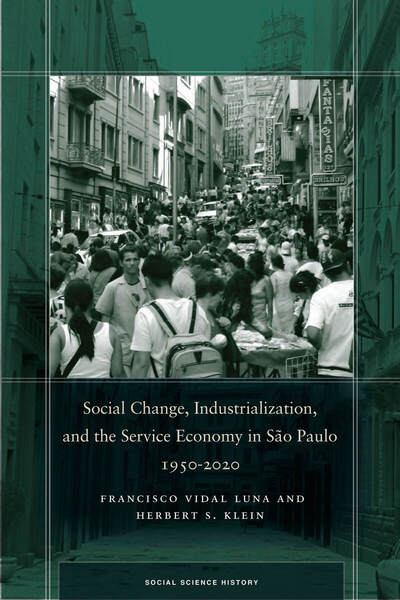
July 2022
432 pages.
$75.00
Hardcover ISBN: 9781503631359
Ebook ISBN: 9781503631847
In the 1950s–80s, Brazil built one of the most advanced industrial networks among the "developing" countries, initially concentrated in the state of São Paulo. But from the 1980s, decentralization of industry spread to other states reducing São Paulo's relative importance in the country's industrial product. This volume draws on social, economic, and demographic data to document the accelerated industrialization of the state and its subsequent shift to a service economy amidst worsening social and economic inequality.
Through its cultural institutions, universities, banking, and corporate sectors, the municipality of São Paulo would become a world metropolis. At the same time, given its rapid growth from 2 million to 12 million residents in this period, São Paulo dealt with problems of distribution, housing, and governance. This significant volume elucidates these and other trends during the late twentieth and early twenty-first centuries, and will be an invaluable reference for scholars of history, policy, and the economy in Latin America.
About the authors
Francisco Vidal Luna is Professor of Economics at Universidade de São Paulo.
Herbert S. Klein is the Gouveneur Morris Professor Emeritus at Columbia University and Research Fellow and Curator at the Hoover Institution, Stanford University.
Their previous volumes with Stanford University Press are Slavery and the Economy of São Paolo, 1750–1850 (2003) and An Economic and Demographic History of São Paulo, 1850-1950 (2018).
"In this superb volume, Luna and Klein play to their strengths, documenting in immense factual detail the key facets of social and economic change in São Paulo from 1950 to 2020. A fundamental reference for anyone who seeks to understand the distinctiveness of São Paulo and the developing world more generally."
—William Summerhill, University of California, Los Angeles
"In classic Luna and Klein style, this book brings their sweeping series on São Paulo into the twenty-first century. It offers a much-needed examination of how São Paulo's classic agricultural-to-industrial-success story has changed since 1950, and the effects of those changes on the economic and social development of the most vibrant economy in Latin America and the economic heart of Brazil."
—Anne G. Hanley, Northern Illinois University
"Recommended."
—B. A. Lucero, CHOICE
"Social Change, Industrialization, and the Service Economy in São Paulo, 1950–2020 is both encyclopedic in its findings and highly readable as a history book. Luna and Klein have done a great deal of important work in pushing forward the study of São Paulo from the late colonial era to the present. This volume is a terrific addition to the historiography."
—Joel Wolfe, Hispanic American Historical Review